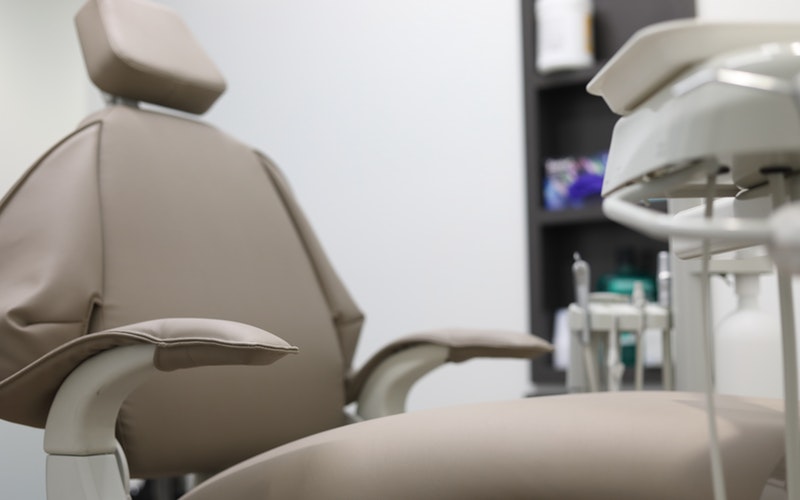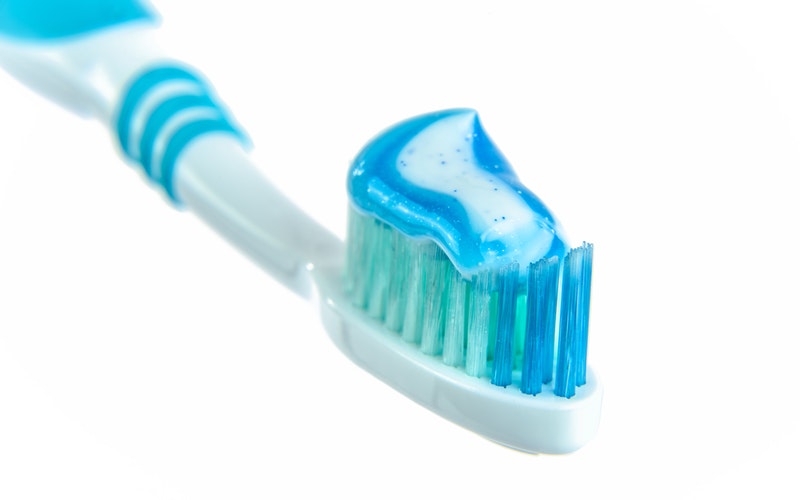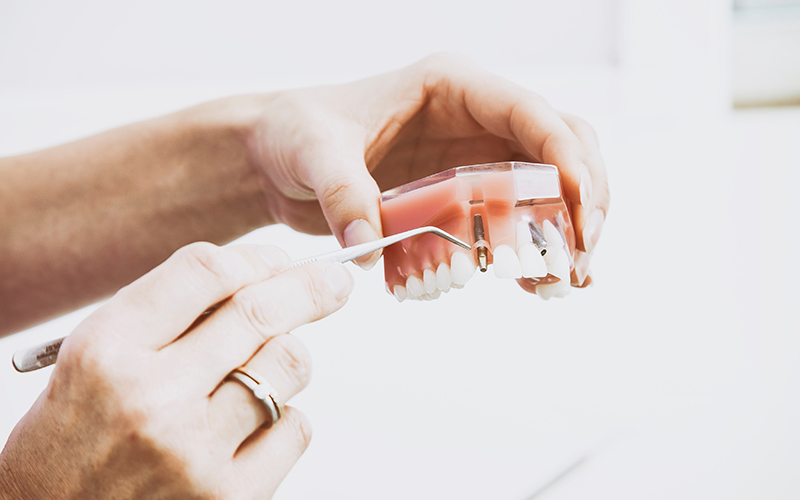Erlanger Dentist Has Treatment for Snoring
It can be disastrous trying to sleep next to a snorer. No matter how hard you try to get to sleep, the loud and obnoxious snores won’t let you. You may secure some temporary relief by prodding the snorer awake or rolling him or her over, but within a few minutes, without fail, the orchestra of saws will start up again.
It can be very difficult not to let such frustrations creep into a relationship, and work and home lives may suffer as your fuse grows shorter and shorter as you become more and more sleep deprived. But what can you do short of finding new sleeping arrangements? Your Erlangerdentist, Dr. Darlene Henry, discusses the causes of those nighttime symphonies and what kind of treatment can stop snoring.
Snoring on an Anatomical Level
The vibration of soft tissues in the throat is responsible for the sound we associate with snoring. As the body relaxes at night, so do the throat’s tissues. When a sleeper lies on his or her back, gravity pulls the tissues into the airway, causing them to vibrate as air flows past them. If you roll the sleeper over, snoring may lessen or stop temporarily because gravity no longer pulls the tissues into the airway.
Treatment for Snoring
In order to treat snoring, your Erlanger dentist, Dr. Henry, may prescribe an oral appliance called a sleep guard for nighttime wear. The sleep guard can help stop snoring because it pushes the lower jaw forward, which opens the airway and keeps it clear even as the body relaxes into sleep. Another benefit of the sleep guard is that it protects teeth from bruxism (teeth grinding), which often occurs in snorers during the night.
Schedule a Visit with Your Erlanger Dentist
Is your spouse’s snoring driving you mad? Are you ready for him or her to stop snoring so that you can finally get some good rest? Set up an appointment or a consultation with your Erlanger dentist, Dr. Henry, today by calling our 41018 dentist office at 859-344-8500. We serve patients from Erlanger, Cincinnati, Crestview Hills, Fort Mitchell, Florence, Union, Independence, and Taylor Mill.
Erlanger Dentist Challenges You to a Quiz about Dentures
Dentures have a tendency of conjuring a certain image in people’s minds. The image involves very fake-looking, clunky prosthetics that slip and slide, causing poor speech and serious embarrassment. Thankfully, that mental image is now more cartoonish than realistic. Advances in dentistry have taken dentures a long way. Just how far they have come may surprise you. So grab a pencil, take this quiz from your Erlanger dentist, Dr. Darlene Henry, and see what you find out about today’s dentures.
The Quiz
- True or False: Dentures are heavy and rarely fit properly.
- True or False: Denture wearers are doomed to have sore gums.
- True or False: Dentures can be held in place by dental implants.
The Answers
- False. Modern dentures are far lighter than their older relatives. Your Erlanger dentist, Dr. Henry, also ensures that they fit properly by taking the whole mouth into account when creating and fitting dentures. The proper fit will keep dentures in place, allowing patients to go about their lives without worrying about embarrassing slips or slurred speech.
- False. Today’s dentures can be worn with comfort and confidence. A full denture completely covers the gums, staying in place with suction. A proper fit and lighter dentures have made sore gums far less prevalent in denture wearers.
- True. For a restoration that feels truly natural, dentures can be supported by dental implants. Using a titanium post that bonds with the jawbone, dental implants hold dentures in place, allowing patients to eat even the toughest foods. Because the dentures are supported by the jawbone just like natural teeth, patients who have implant-supported dentures sometimes report forgetting that they have prosthetic teeth.
Schedule a Visit with Your Erlanger Dentist
A life without teeth is no life at all. If you have lost some or all of your teeth, dentures can restore your smile. Schedule an appointment with your Erlanger dentist, Dr. Henry, today. Call our 41018 dentist office at 859-344-8500. We serve patients from Erlanger, Cincinnati, Crestview Hills, Fort Mitchell, Florence, Union, Independence, and Taylor Mill.
Erlanger Dentist: Take This Dental Quiz
Your knowledge about dentistry and proper homecare practices are one of the most important factors affecting your oral health. It doesn’t matter how diligent you are with your brushing and flossing if you are doing things incorrectly. Therefore, it is time you tested your knowledge about homecare and dentistry, and what better way than with a dental quiz from your Erlanger dentist, Dr. Darlene Henry.
Take the Quiz
- True or False: You should brush your teeth as often as possible.
- True or False: Brushing your teeth forcefully is beneficial because it helps to remove plaque.
- How much floss should you use?
- How often should you attend a dental visit?
Check Your Answers
- False. While bacteria and plaque removal is a priority, brushing too often can actually be harmful. If you brush too often, you can wear away enamel from your teeth and damage your gums. Therefore, your Erlanger dentist, Dr. Henry, recommends that you brush your teeth twice a day. Brushing twice a day strikes a good balance between brushing too often and not brushing often enough.
- False. If you brush your teeth too forcefully, you will damage your teeth and gums.
- You should use about 18 inches of dental floss when flossing. Using this much floss allows you to use clean sections of the floss continually as you make your way through your mouth. If you do not use clean sections of the floss, you will spread bacteria around rather than remove it.
- You should attend a dental visit with your Erlanger dentist once every six months. During these visits, a hygienist can remove stubborn plaque and tartar, giving you a cleaner and healthier mouth.
Schedule a Visit with Your Erlanger Dentist
If more than six months have passed since your last dental visit, you are ready for a checkup. Schedule an appointment with your Erlanger dentist, Dr. Henry, today by calling our 41018 dentist office at 859-344-8500. We serve patients from Erlanger, Cincinnati, Crestview Hills, Fort Mitchell, Florence, Union, Independence, and Taylor Mill.
Erlanger Dentist Explains the Benefits of Dental Implants
With today’s advancements in dentistry, a lost tooth no longer has to be a cause for panic. Dental implants provide high quality, functional, and aesthetically pleasing restorations that mimic natural teeth. Their capabilities have pushed them to the lead of all tooth-replacement procedures. Here to explain why is your Erlanger dentist, Dr. Darlene Henry. She discusses the benefits of dental implants.
What Is a Dental Implant?
A dental implant is a prosthetic made up of three parts, used to complete an effective restoration for a missing tooth. The three parts of a dental implant are the crown, the post, and the abutment. The crown is the part of the implant that shows above the gum line. It is custom made to blend in with surrounding teeth, offering a realistic appearance even under close scrutiny. The crown is also strong, allowing patients to eat tough foods without a second thought.
But as impressive as the crown is, the post is the true star of the dental implant. The post is a piece of titanium that is inserted into the gums and the jawbone. Once it is in place, the post fuses with the jawbone in a process called osseointegration. When osseointegration is complete, the post provides a firm foundation for the entire dental implant, preventing any movement.
The final piece of the dental implant is the abutment. It simply serves as a connection point between the crown and the post. The abutment is also very sturdy and prevents any movement or twisting of the crown.
Benefits of Dental Implants
In addition to providing a high quality restoration, dental implants prevent complications stemming from tooth loss. Sometimes when a tooth’s root leaves the jaw, more teeth fall out in a process called the domino effect. The jawbone may also lose density. These complications occur because the body ceases sending nutrients to the area vacated by the tooth when the tooth’s root leaves the jaw. The dental implant’s post reverses this effect and thus restores nutrition the area.
Dental Implants in Erlanger
Do you have a missing tooth? A dental implant can replace it with a functional and aesthetically pleasing restoration. Schedule an appointment with your Erlanger dentist, Dr. Henry, today by calling our 41018 dentist office at 859-344-8500. We serve patients from Erlanger, Cincinnati, Crestview Hills, Fort Mitchell, Florence, Union, Independence, and Taylor Mill.
Erlanger Dentist Shares Tips for Fresh Breath
Few things can make you more self-conscious than having bad breath. Rather than focus on a conversation with a friend or loved one, your attention will likely be more focused on ways to mask your breath. Unfortunately, this effort may be interpreted as rudeness rather than kindness. Thus, maintaining fresh breath plays an important role in your self-confidence and in your interactions with others. So if you’re looking for tips for fresh breath, look no farther than your Erlanger dentist, Dr. Darlene Henry. She explains the causes and remedies for bad breath.
What Causes Bad Breath?
The most common cause of bad breath is bacteria in the mouth. Bacteria cling to teeth and feed on residual sugar in the mouth. The focus of achieving fresh breath, therefore, is the removal of these bacteria.
Tips for Fresher Breath
- Brush and floss your teeth regularly. Brush your teeth twice a day, being sure to angle the bristles of your toothbrush down toward the gum line. Also, be sure to brush your tongue to remove any bad-breath causing bacteria on its surface. Flossing is also an important part of ensuring fresh breath. Floss cleans surfaces of the teeth that a toothbrush cannot.
- Attend regular dental visits. Sometimes plaque and tartar stick around despite your best efforts. Professional cleanings can remove this plaque and tartar and the bacteria contained within each of them, resulting in fresher breath.
- Stay hydrated. Did you know that saliva plays in important role in cleaning your teeth? Saliva can neutralize acids, protecting teeth from decay. It can also aid in keeping teeth free of bacteria. However, when you are dehydrated, your mouth does not produce as much saliva. Therefore, staying hydrated can actually keep your breath fresher for a longer period of time.
Schedule an Appointment with Your Erlanger Dentist
Professional cleanings can remove bacteria-ridden plaque and tartar and keep teeth healthy. If it’s been more than six months since your last dental visit, schedule an appointment with your Erlanger dentist, by calling our 41018 dentist office at 859-344-8500. We serve patients from Erlanger, Cincinnati, Crestview Hills, Fort Mitchell, Florence, Union, Independence, and Taylor Mill.
Erlanger Dentist: Gum Bacteria Manipulate the Immune System
Did you know that over 50 percent of adults age 50 and older develop some form of gum disease? Once a person develops gum disease, it could progress into a more severe form that results in the decay of teeth-supporting tissues and ligaments, which in turn, could lead to tooth loss. But what do you think of when you hear the words “gum disease”? Many people automatically think of gingivitis. If you know your Greek and Latin, you’ll know that gingivitis means inflammation of the gums. Itis is a Greek suffix meaning inflammation, and gingiva, is the Latin word for gum. However, inflammation of the gums doesn’t sound so bad, a bit like a rash for your mouth. Surely it will just go away on its own, right? Perhaps not. Recent research shows that the bacterium responsible for gingivitis actually inhibits the immune system from fighting against it. Your Erlanger dentist, Dr. Darlene Henry, discusses this research and the bacterium known as porphyromonas gingivalis.
Porphyromonas Gingivalis and the Immune System
When porphyromonas gingivalis, the bacterium responsible for gingivitis, enters the body, it triggers the production of an anti-inflammatory molecule called IL-10. This molecule interferes with T-cells, the cells responsible for fighting bacteria. Because it has these effects, gingivitis can often progress to a more damaging form of gum disease and eventually lead to tooth loss if it is not treated.
Preventive Care Against Gingivitis
Gingivitis is typically caused by the presence of bacteria on a tooth near the gum line. To defend against these bacteria, homecare and regular dental visits are important. Brush your teeth twice a day, angling the bristles of the toothbrush down toward the gum line, and floss once a day. Also, visit your Erlanger dentist, Dr. Henry every six months for checkups and cleanings.
Schedule an Appointment with Your Erlanger Dentist
Professional cleanings can remove stubborn plaque and tartar and keep teeth healthy. If it’s been more than six months since your last dental visit, schedule an appointment with your Erlanger dentist, by calling our 41018 dentist office at 859-344-8500. We serve patients from Erlanger, Cincinnati, Crestview Hills, Fort Mitchell, Florence, Union, Independence, and Taylor Mill.
Erlanger Dentist: What Flossing Can Do for You
Remember the way it feels to get corn stuck between your teeth? It isn’t very pleasant. Luckily, we have dental floss for just such a problem. But dental floss can do far more than remove pesky food from between your teeth. It’s an excellent tool for cleaning the areas of your mouth that are more difficult to access. Your Erlanger dentist, Dr. Darlene Henry, elaborates on the vital role flossing plays in the health of your mouth.
What Flossing Does for Your Mouth
Flossing cleanses areas of the mouth, where the toothbrush is ineffective. These areas are between each of your teeth. When most people think about the parts of a tooth that need cleaning, they probably think of the top, front, and back of the tooth. The surfaces between teeth tend to slip through the cracks. However, there is a whole surface hidden there, and that’s where flossing comes in. It cleans where brushing can’t.
Colgate has a great advertising campaign right now that tries to make flossing more memorable. Follow this link to check it out: http://adsoftheworld.com/media/print/colgate_total_dental_floss_photoshop_disasters_2. It’s a great ad because it draws our attention to the disparity between the things we see that are stuck between our teeth and the things we don’t see like disembodied hands or the hidden surfaces of our teeth.
Tips for Flossing Effectively
Flossing is an easy process once you get the hang of it. Dr. Henry recommends flossing once a day. Try the following tips to floss more effectively:
- Use about 18 inches of floss.
- Leave 2-4 inches between your hands.
- Be sure to hold the floss tight between your index fingers and thumbs.
- As you floss, continue to use clean sections of the floss.
- Be gentle. Slide the floss between your teeth and up and down along the side of each tooth.
- When you are finished, rinse your mouth with water or mouth wash.
Visit Your Erlanger Dentist
Have you visited Dr. Henry in the past six months? Regular six-month checkups and cleanings are a good practice for maintaining a healthy mouth. Call our 41018 dentist office at (859) 344-8500. We serve patients from Erlanger, Cincinnati, Crestview Hills, Fort Mitchell, Florence, Union, Independence, and Taylor Mill.
OTC Sleep Aids: A Problematic Solution for Occasional Insomnia
Americans leads incredibly busy lives. Between the demands of work, family, and leisure activities, it seems we never get any down time. Unfortunately, this on-the-go lifestyle can have a significantly negative impact on your ability to get a good night’s sleep. According to the National Sleep Foundation, approximately 48% of American adults report having occasional insomnia and many of them turn to over-the-counter sleep aids as a way to get the sleep they need. While OTC sleep aids can help you fall asleep, they can also cause problems. Your Erlanger dentist, Dr. Darlene Henry, discusses the impact OTC sleep aids can have on oral health and offers some solutions to help you rest.
About OTC Sleep Aids
Most conventional over-the-counter sleep aids contain an antihistamine as the primary ingredient. Normally used to combat allergies and colds, the most common side effects of antihistamines include feelings of relaxation and sleepiness. While an antihistamine-containing sleep aid can certainly help you achieve a good night’s sleep on occasion, they also have several unwanted side effects, including:
- Feeling groggy or sleepy the day after usage.
- Most people build up a tolerance to these sleep aids very quickly, so they have to take a higher, potentially unsafe dosage.
- OTC sleep aids counteract badly with alcohol and some prescription medications.
OTC Sleep Aids and Dry Mouth
One undesired side effect of sleep aids that contain antihistamines is their drying effect on the mouth. In addition to an unpleasant, cotton-mouthed feeling, dry mouth can lead to significant oral health problems. Saliva serves several key purposes in the mouth, including washing away dead cells, bacteria, and particles of food. If healthy saliva levels drop, all of these materials begin to build up on the tongue, at the gum line, and between teeth. This can result in bad breath and an increased risk of gum disease and tooth decay.
A Surprising Cause of Insomnia (and How Your Dentist Can Help!)
Many people who suffer from insomnia or who report feeling chronically tired or sleepy during the day can blame obstructive sleep apnea, or OSA, for their problem. When a person sleeps, the muscles in their airway relax. In a person with OSA, the airway relaxes so much that it interferes with their ability to breath. The airway closes and the person’s brain, sensing that the body isn’t receiving enough oxygen, forces the person to wake up. These episodes of wakefulness can occur hundreds of time a night, resulting in poor sleep quality. Many OSA sufferers take OTC sleep aids in an attempt to get better sleep but they do nothing to address the root of the problem. Your dentist can prescribe a custom-fitted mouthpiece that pushes your jaw forward and reduces the level of airway obstruction. Once the underlying problem of sleep apnea is addressed, most patients no longer need to rely on sleep aids to get the sleep they need.
Schedule an Appointment for a Better Night’s Sleep
To schedule an appointment with Dr. Darlene Henry, call our Kentucky dental office at (859) 344 – 8500. We gladly serve patients from Cincinnati, Crestview Hills, Fort Mitchell, Florence, Union, Independence, Taylor Mill, and surrounding communities.
Erlanger Dentist Explains TMD and Earaches
Experiencing jaw pain is not uncommon. In fact, if your jaws ache occasionally or feel fatigued, you may have no need to worry. But when your jaw pain coincides with other maladies, you should see your dentist. Your pain could stem from a problem with your temporomandibular joints. Typically, a TMJ disorder (TMD) causes localized pain affecting your head, neck, and ears. Relieving the pain can be simple and non-invasive, if treated early enough. You can avoid complications from TMD, like worn and broken teeth, by seeking council from a dental professional. In this article, Erlanger cosmetic dentist Dr. Darlene Henry explains the connection between TMD and earaches.
Earaches from TMJ Disorder
The temporomandibular joints that connect your lower jaw to your skull are sensitive. A thin disc rests between the jaw and temporal bones to smooth common motions associated with chewing, talking, and yawning. When your jaw sustains injury from physical trauma or excessive stress from clenching or teeth grinding (bruxism), the TMJs can become unbalanced, and you can experience pain in various places. An unbalanced joint irritates nerves that cause earaches and ear ringing, which TMD treatment may remedy.
TMD Treatment
Usually, preventing teeth grinding can lessen pain from TMD dramatically. To achieve this, Dr. Henry can prescribe a custom-fitted oral appliance for you to wear at night. We also offer Botox treatments to relax jaw muscles and stop bruxism. The effects of Botox last for approximately three months, so you may need additional treatments if bruxism continues to cause pain. Teeth grinding wears down teeth and could break them, which can be the source of earaches or radiant pain. Dr. Henry offers color-matched restorations that strengthen teeth to relieve pain.
Schedule an Appointment with Your Erlanger Dentist
Visit our 41018 dentist office to talk with Dr. Henry about the right TMD treatment for you. We make going to the dentist a relaxing, welcoming experience. If your pain is caused by malocclusion or crooked teeth, she can suggest a respected orthodontist to help directly treat your condition. Call (859) 344-8500 to schedule an appointment. We welcome patients from Erlanger, Cincinnati, Crestview Hills, Fort Mitchell, Florence, Union, Independence, and Taylor Mill.









